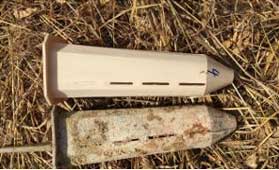PLA container in use in Thailand’s rubber industry

Dutch materials firm Corbion, Global Bio-Polymers and Maxrich are collaborating on the development of a biodegradable root growth container to improve the agricultural efficiency and environmental performance of rubber tree plantations. The container is intended to bring threefold benefits to the Thai rubber industry; encourage young rubber trees to root more effectively to increase tree longevity, improve survival yield rates during outplanting, and offer a more environmentally sustainable alternative to traditional, non-biodegradable plastic containers.
Natural rubber is a key agricultural product in Thailand. In 2012, natural rubber was the second economic contributor to the agricultural economy, second only to rice1. In 2015, Thailand produced around 4.5 million tonnes of natural rubber2. Every year 90 million new rubber trees are planted in Thailand alone3.
Currently, rubber trees are planted in nurseries, above ground, in polyethylene (PE) film bags or polypropylene (PP) cones. These containers ensure that the roots grow in a contained vessel, enabling the farmer to transport and plant them easily. Once the mature trees are outplanted, the cutting off of the bag or cone can damage the root system and result in yield loss of the final tree crop, at a cost of THB 90/EUR 2.30 per lost tree4.
The PE bags (or parts thereof) can end up left on the land or blown away – resulting in litter, polluting the local environment and endangering local wildlife. Currently, the bag container is favoured over the cone due to the ease with which it can be cut off. However, the cone promotes better directional growth of the roots and can promote a longer tree life of around five years, resulting in economic value of US$100 per extra year of successful growth5. The cone, however, is more difficult to remove at time of outplanting and results in yield loss due to root damage during this step.
The bioplastic container project is intended to provide an alternative to the existing options of PE bag/PP cone. A bioplastic cone would offer the benefits of directed root growth (promoting longer tree life and increasing economic value per tree) combined with biodegradability at end of life (no need to cut off the container, thus reducing the current root damage yield loss created during container removal when outplanting). The biodegradable containers would eliminate the current littering of non-biodegradable plastics currently caused by the existing PE bag solution.
The bioplastic cone will be based on Corbion Purac's Poly Lactic Acid (PLA) along with other biopolymers. The bioplastic compound will be specially developed to match the climatic conditions and needs of both the nursery and the plantation, in various geographical locations in Thailand. The PLA is made from sugarcane grown locally in Thailand, making this a truly circular and local-for-local application.
Corbion, who is on track to build a 75 kTpa PLA plant in Thailand, and Global Bio-Polymers will be jointly developing the custom compounds for the project, whereas Maxrich will produce the containers.
Nopadol of Maxrich is enthusiastic about the development: "This project shows great promise for significant change to rubber plantation techniques. The performance benefits combined with the sustainability improvements are a real game-changer for local farmers here in Thailand, while supporting environmental protection of our country. We envision that when successful, this same concept could be applied to other economic crops, fruit orchards and teaks."
Corbion is supporting the project with technical expertise on the bioplastic material and cone production. Chalermkiatkul, Business Development PLA at Corbion Purac Thailand, says: "PLA bioplastics are a perfect material for the rubber tree root protection containers, given their biodegradability and performance. The fact that they are also made from feedstocks grown here in Thailand - made into bioplastic monomers via our 75kT lactide facility here in Rayong - makes the project even more interesting. Corbion is proud to promote the circular, biobased economy in Thailand in this way".
Corbion says that respecting the natural cycle of rubber trees, it will need time for development and testing to adapt and tailor the bioplastic compound to local conditions and ensure an optimal combination of performance and environmental benefits in the final part. And though it says it is early days yet, initial trials have gleaned positive results.
1 FAOSTAT. (2013) Thailand: Food and Agricultural commodities production. Available at: http://faostat.fao.org/DesktopDefault.aspx?PageID=339&lang=en&country=216[Accessed: 4 September 2016].
2 The Thai Rubber Association (2016) Thai Rubber Statistics: NR Balance Account of Thailand 2012-2015. Available at: http://www.thainr.com/en/?detail=stat-thai [Accessed: 4 September 2016].
3 Maxrich internal data.
4 Maxrich internal data.
5 Maxrich internal data.
(PRA)Copyright (c) 2016 www.plasticsandrubberasia.com. All rights reserved.














































